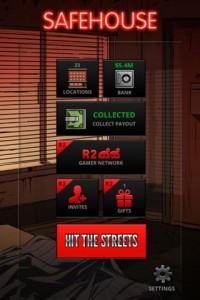 First, congrats on what is by all accounts an explosively successful business launch! We see that Life is Crime is your debut game under the Red Robot Labs label, but what are some of the highlights of your team’s game industry experience prior to founding this studio?
First, congrats on what is by all accounts an explosively successful business launch! We see that Life is Crime is your debut game under the Red Robot Labs label, but what are some of the highlights of your team’s game industry experience prior to founding this studio?
Mike Ouye: Thanks! We are extremely proud of Life Is Crime. Android (over 1 million and counting) and iOS gamers alike have embraced the game. The entire Red Robot team loves games and we (co-founder and CEO, Mike Ouye and co-founder/CPO, Pete Hawley) have extensive industry experience in both console and social gaming.
I ran monetization and revenue efforts for leading social gaming start-ups, Playdom (Social City, Mobsters, Sorority Life) and Crowdstar (Happy Aquarium and It Girl). Prior to my work in social gaming, I worked in performance advertising at online agency Adteractive and led integrations at online payment gateway Cybersource.
Pete Hawley: I was the Vice President of Product Development at Electronic Arts, Executive Producer at Criterion Games, and led the Burnout Paradise development team before moving to Redwood Shores and co-starting the EA2D label.
Back in the UK, I was Development Director at Sony Computer Entertainment, leading Europe’s External Development team in London. I handled European talent procurement and studio investments, resulting in projects like Guerilla Games’ Killzone, Freestyle Games’ BBoy, and Ninja Theory’s Heavenly Sword, as well as funding the start-up of Media Molecule’s Little Big Planet.
I was one of the first employees at British game development studio, Lionhead, where we launched Black and White, Fable and The Movies. I was also a Producer on the international hit PS1 title, Driver, back in 1999.
 Red Robot Labs is one of the very few studios I’ve seen where the job openings website page actually contains, well – job openings! And you’ve just sealed a partnership that gives your studio direct access to the European market, right?
Red Robot Labs is one of the very few studios I’ve seen where the job openings website page actually contains, well – job openings! And you’ve just sealed a partnership that gives your studio direct access to the European market, right?
Yes, we opened offices in London that will focus on expanding the game portfolio of our R2 geo gaming platform. Red Robot’s R2 platform allows mobile developers to leverage RR’s location-based gaming services, proprietary game engine technology, and social-mobile gaming network.
We also acquired a subsidiary in the UK, the independent gaming company Supermono, who will continue to produce cutting-edge indie games for our platform.
We’re now up to 30 employees in the US (we started out at three). We outgrew our Palo Alto office so a couple weeks ago we moved into a new space in Mountain View.
Why the ambitious expansion in today’s economic climate – do you see this as a head start for continued success rather than a huge business risk?
As an independent studio, we can move really fast and iterate on product and games even faster. You don’t need three years, 100 people, and $20 million to produce a game anymore. With iOS and Android, you’re able to create games quickly, efficiently, and get them to millions of people. It’s an exciting time to be an indie game creator in mobile. There’s tons of opportunity, big audiences, and the ability to build a successful business around it.
 One of these opportunities was to launch on Android first, and then approach the iOS market — a unique approach that went against the status quo. So far it has paid off; Life Is Crime has over a million downloads on Android since its launch at PAX West in August 2011. This created momentum so that when it released on the iTunes App Store on January 5th, it rose to number two on the Free Apps list.
One of these opportunities was to launch on Android first, and then approach the iOS market — a unique approach that went against the status quo. So far it has paid off; Life Is Crime has over a million downloads on Android since its launch at PAX West in August 2011. This created momentum so that when it released on the iTunes App Store on January 5th, it rose to number two on the Free Apps list.
But to answer your question about risk: there’s risk in any start-up, but the reception we’ve received from the gaming community has been overwhelming and awesome. We also have an amazing set of advisors who really believe in our product. We saw an opportunity to leverage the explosive growth of smart phones and massive adoption of location-based applications and produce something really sticky. And we’re seeing the rewards of that decision. We’re ambitious, but we’re not impulsive. We strategically think about what we want to produce and how we’re going to present it to the public. We’re off to a good start, but by no means are we done.
And we are still hiring, so if mobile gaming is your thing you should come work for us!
Tell us a little about the R2 geo gaming platform and what features make this one different from other location-based MMO game engines – how does it enrich the player’s experience in Life is Crime compared to previous releases in this genre?
We’ve taken a unique approach with our platform — it’s built from the ground up to support location-based and mobile-social games. Social games are unique in that game design is very metrics-based, so we have BI built in and ready to go. They also need to have strong, fun, local-social components, so we built a social graph that drives discovery of people and places by location. Our backend technology allows cross platform, persistent game worlds across iOS and Android. The platform is really built to allow game developers to focus on building location-based games quickly and easily, without the constraints of building a backend location-ready game engine. We built it to help accelerate the location gaming space, and we’re hoping to get a lot of traction on it this year.


